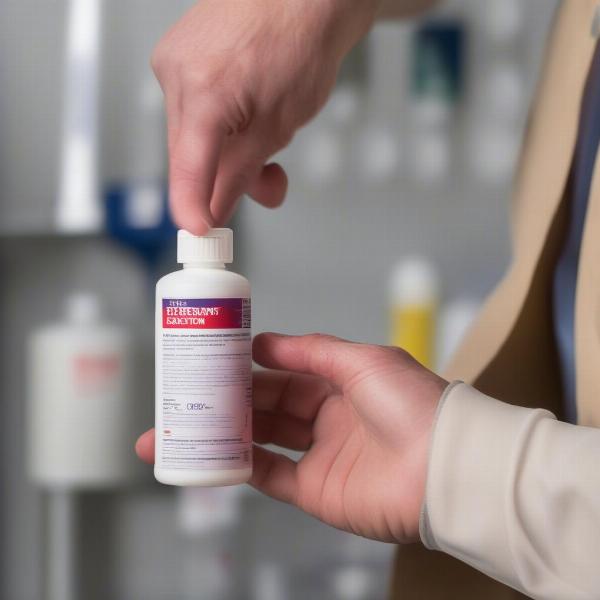Ringer’s lactate, also known as lactated Ringer’s solution, is a fluid therapy commonly used in veterinary medicine, especially in emergency situations for dogs. This comprehensive guide will explore the uses, benefits, and potential risks of Ringer’s lactate for dogs, providing valuable insights for both concerned pet owners and experienced dog handlers. Understanding its role in treating dehydration, shock, and other critical conditions can equip you with the knowledge to make informed decisions about your canine companion’s health.
Understanding Ringer’s Lactate
Ringer’s lactate is an isotonic crystalloid solution that closely resembles the electrolyte composition of blood plasma. This makes it an effective fluid replacement therapy for dogs experiencing dehydration or fluid loss due to various reasons. The solution contains sodium, chloride, potassium, calcium, and lactate, which are essential electrolytes for maintaining normal bodily functions. It is crucial to remember that administering Ringer’s lactate should always be under the guidance of a veterinarian.
 Ringer's Lactate Solution for Dogs
Ringer's Lactate Solution for Dogs
Why is Ringer’s Lactate Used in Dogs?
Veterinarians use Ringer’s lactate in dogs for a variety of reasons, including:
- Dehydration: Ringer’s lactate helps restore fluid balance in dehydrated dogs caused by vomiting, diarrhea, heatstroke, or decreased water intake.
- Shock: In cases of shock, whether due to trauma, blood loss, or other causes, Ringer’s lactate helps improve blood volume and circulation.
- Kidney Disease: Ringer’s lactate can support kidney function by promoting urine production and flushing out toxins.
- Post-Surgery: After surgical procedures, Ringer’s lactate can help stabilize fluid and electrolyte levels.
- Medication Administration: Ringer’s lactate can be used as a diluent for certain intravenous medications.
Administering Ringer’s Lactate: Veterinary Supervision is Key
Ringer’s lactate is typically administered intravenously (IV) by a veterinarian. The dosage and rate of administration depend on the dog’s weight, condition, and the underlying cause of fluid loss. Attempting to administer Ringer’s lactate at home without proper veterinary guidance is strongly discouraged and can be dangerous. Incorrect administration can lead to fluid overload, electrolyte imbalances, and other complications.
Potential Side Effects and Risks
While Ringer’s lactate is generally safe, some potential side effects include:
- Fluid Overload: Excessive administration can lead to fluid buildup in the lungs, causing difficulty breathing.
- Electrolyte Imbalances: Monitoring electrolyte levels is crucial to avoid imbalances, which can affect heart function and other vital processes.
- Allergic Reactions: Although rare, allergic reactions can occur. Signs may include swelling, hives, or difficulty breathing.
When to Seek Veterinary Care
If your dog is showing signs of dehydration, such as lethargy, dry gums, sunken eyes, or loss of skin elasticity, seek immediate veterinary attention. Similarly, if you suspect your dog is in shock, characterized by pale gums, rapid breathing, weakness, or collapse, immediate veterinary intervention is critical.
Conclusion
Ringer’s lactate is a valuable fluid therapy for dogs in various critical situations, offering a means to restore hydration, manage shock, and support overall well-being. However, its administration requires careful veterinary supervision. Understanding the uses, benefits, and potential risks associated with Ringer’s lactate empowers dog owners to collaborate with their veterinarians to provide the best possible care for their furry companions.
FAQ
- Can I give my dog Ringer’s lactate at home? No, Ringer’s lactate should only be administered by a veterinarian.
- What are the signs of dehydration in dogs? Lethargy, dry gums, sunken eyes, and loss of skin elasticity.
- Is Ringer’s lactate safe for all dogs? Generally, yes, but there are potential side effects, and veterinary monitoring is essential.
- How is Ringer’s lactate administered? Typically intravenously (IV).
- What should I do if my dog is showing signs of shock? Seek immediate veterinary attention.
- Can Ringer’s lactate be used for long-term fluid therapy? This depends on the dog’s condition and should be determined by a veterinarian.
- What are the alternatives to Ringer’s lactate for fluid therapy? Other crystalloid and colloid solutions exist, and the best option will depend on the individual case.
About ILM Dog
ILM Dog is your trusted global resource for expert dog care and breeding information. We offer practical advice on Dog Breeds and Selection, Health and Medical Care, Training and Behavior, Nutrition and Feeding, Grooming and Hygiene, and Products and Accessories. Whether you’re a seasoned dog owner or just starting your journey, ILM Dog provides reliable insights and guidance. Contact us at [email protected] or +44 20-3965-8624 for personalized support.